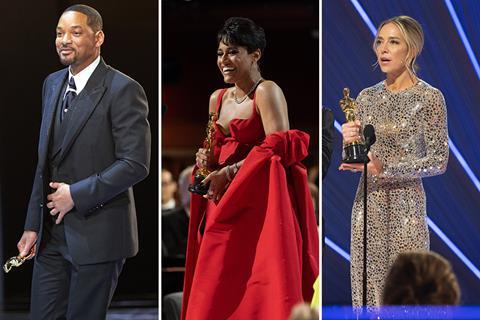
Sundance was (also) a big winner
Yes, Coda was the first best picture win shepherded to glory by a US streamer in Apple Original Films, and yes Will Smith’s slap of Chris Rock threatened to drown out all the other noise on the night. But Sundance also won big, with Coda the first Sundance title to win the best picture Oscar. It also picked up the best adapted screenplay prize for Sian Heder and the supporting actor award for Troy Kotsur, the first deaf actor to win the prize.
Both Coda and Questlove’s popular best documentary winner Summer Of Soul (…Or, When The Revolution Could Not Be Televised) were Day One screenings at Sundance 2021, the first of two online editions of the pandemic era (so far) under artistic director Tabitha Jackson. Coda won Sundance’s four big narrative awards and Summer Of Soul picked up two doc prizes in Park City that year.
Apart from Drive My Car, which premiered in Cannes Competition last summer, the other big winners on the night all debuted at the autumn festivals: Venice (The Power Of The Dog, Dune), Telluride (Belfast, King Richard), and Toronto (The Eyes Of Tammy Faye). West Side Story, Nightmare Alley and Licorice Pizza all opened directly in cinemas while Don’t Look Up was a Netflix drop in time for the holiday season.
Apple bites into the Oscars
Apple TV+ memorably won a record-breaking bidding war for Coda at that feted Sundance 2021, paying $25m for worldwide rights, prompting sales agent and financier Pathe to renegotiate the deals it had already done with indie distributors around the world.
The impact of a streamer winning the top prize should not be underestimated and that line has now been firmly crossed – although it is somewhat surprising that Netflix didn’t get there first. While Jane Campion won the best director prize for her Netflix-backed The Power Of The Dog (the streamer’s second win in that category after Alfonso Cuaron triumphed with Roma three years ago), the film’s front-runner status for best picture always looked shaky at best and, ultimately, Coda’s feel-good, inclusive message in difficult times, combined with its easily digestible 110-minute running time, coalesced at the right moment for Apple and Coda.
Whereas the companies behind most best picture winners would be looking to capitalise on their Oscar-night triumph by re-releasing the film back into cinemas in key markets, as of the morning after it’s still unclear if Apple has any plans to do this. What will be very interesting to see is whether the company receives a sustained subscription boost to its streaming platform off the back of Coda’s win.
Warner Bros leads the way for legacy studios
Following seven wins for Netflix in 2021, in a year when cinemas were mostly closed, the legacy studios enjoyed something of a comeback this time around as the awards on the night were spread out amongst a variety of titles and distributors (see also the Baftas).
Warner Bros was the most successful studio with seven awards – six for Dune which was the most successful title of the night in terms of final Oscars tally, plus one for King Richard in Will Smith’s best actor win.
Disney followed with six statuettes, one each for its own Encanto (animated feature) and Cruella (costume design), two for Searchlight Pictures’ The Eyes Of Tammy Faye (best actress for Jessica Chastain and make-up and hairstyling), one for the aforementioned Summer Of Soul – co-distributed by Searchlight and Hulu – and one for 20th Century Studios’ West Side Story (Ariana DeBose’s best supporting actress win).
Apple banked three awards for Coda, while Netflix (director for Campion), Focus Features (Kenneth Branagh’s original screenplay win for Belfast), United Artists/Universal (original song for No Time To Die) and Janus Films (international feature for Drive My Car) all picked up one apiece.
The slap heard around the world
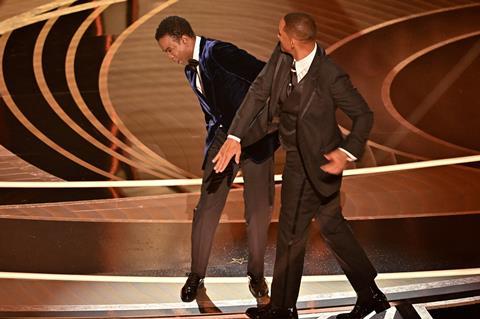
When Will Smith stormed on stage and slapped presenter Chris Rock after the latter made an off-colour joke about Jada Pinkett Smith’s alopecia, the nervous audience laughter seemed to suggest this was some kind of skit. But then Smith returned to his seat and shouted “keep my wife’s name out of your fucking mouth!”, and the auditorium descended into a hushed, awkward silence.
Smith sheepishly acknowledged the moment when he returned to the stage to collect his best actor Oscar for King Richard: “I want to apologise to the Academy. I want to apologise to my all my fellow nominees… love will make you do crazy things.” Nonetheless, the damage was done and the actor had overshadowed the biggest night of his career, and indeed the whole 2022 ceremony, with a moment of madness.
In the wake of the event, the Academy released a vague statement stating it “does not condone violence of any form”, without referencing the incident directly, while Rock made clear that he would not be pressing charges. In a somewhat crass tweet, Oscars telecast producer Will Packer wrote: “Welp… I said it wouldn’t be boring”.
The utterly incomprehensible moment drew attention away from the fine hosting of trio Amy Schumer, Wanda Sykes and Regina Hall (Schumer attempted to defuse the tension in her first post-slap appearance – “Did I miss anything? There’s, like, a different vibe in here”), as well as other tweaks to the telecast that Packer had instigated this year. The first was the tech and shorts categories being doled out before the live broadcast, in an effort to cut the runtime down to a manageable three hours. The result? A ceremony that ran 40 minutes over.
The other innovation – a pair of new fan-voted categories – will definitely need rethinking, after two Zack Snyder-directed films collected the prizes. His iteration of Justice League won the #OscarsCheerMoment, whilst the director’s Army Of The Dead won the #OscarsFanFavorite title. Both awards were voted for on Twitter, Snyder’s passionate online fanbase were galvanised to see him to victory, and the results highlight the issue behind any crowd-sourced awards (the Johnny Depp-starring Minamata was another close contender for the fan favourite crown).
Update: Will Smith resigns from Academy over “shocking, painful, and inexcusable” actions
A night of firsts
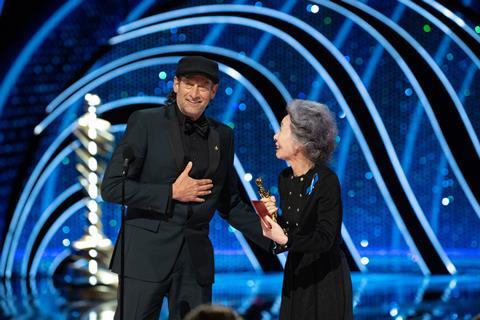
Although somewhat overshadowed by Smith’s on-stage outburst, the night did enjoy a series of historic and important wins. Troy Kotsur became the first deaf male actor to win an Oscar for acting for his role in Coda. His co-star, Marlee Matlin, was the first deaf actress to win an Academy Award, for her role in 1986 film Children Of A Lesser God.
Afro-Latina actress Ariana DeBose is now the first openly queer woman of colour to clinch an Oscar, taking home the best supporting actress prize – West Side Story’s only win out of seven nominations. Yvett Merino became the first Latina producer to win an Oscar, with Encanto winning in the animated feature category.
Other awards that show the Academy is continuing to make progress with regards to racial representation include Will Smith’s best actor win for King Richard and Ahmir “Questlove” Thompson’s Summer of Soul (…Or, When The Revolution Could Not Be Televised) clinching the best documentary feature prize. It’s Smith’s first ever win, after two prior nominations for Ali and The Pursuit Of Happyness, and makes him only the fifth Black actor to take the best actor prize – and the first since Forest Whitaker in 2006 for The Last King Of Scotland. (The others are Sidney Poitier in 1963 for Lilies Of The Field, Denzel Washington in 2001 for Training Day and Jamie Foxx in 2004 for Ray.)
Early frontrunner The Power Of The Dog took home just a single win out of its 12 nominations – but it was a significant one. Campion is the first woman to be nominated for the best director Oscar twice after her 1994 nod for The Piano, and is now the third female director to take home the prize. The award has previously been won by Kathryn Bigelow in 2009 for The Hurt Locker and Chloé Zhao last year for Nomadland.
One history-making title that did leave empty-handed was Jonas Poher Rasmussen’s animated documentary about a refugee from Afghanistan, Flee. It was the first title ever to be nominated in the documentary, animated and international feature categories, but lost out in all three.
The Power Of The Dog’s Ari Wegner was a hot contender to be the first woman to win in the best cinematography category, but Dune’s Greig Fraser took home the prize on the night.
International influence and UK winners
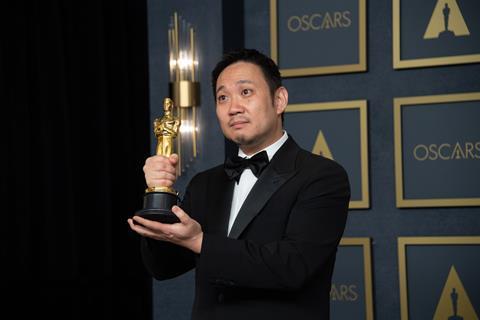
The Academy’s increasingly international voting membership continued to exert its influence on this year’s line-up of nominees and winners. Ryusuke Hamaguchi’s Drive My Car took home best international feature for Japan, having secured three further nominations. Also represented in the room (outside of the international category) were Spain, Norway, Denmark and India by nominees Penelope Cruz, Joachim Trier’s The Worst Person In The World and documentaries Flee and Writing With Fire, respectively.
UK director Aneil Karia and actor Riz Ahmed (both Screen Stars of Tomorrow) picked up the Oscar for best live-action short with their powerful film, The Long Goodbye.
There were among several UK figures to win the golden statuette. Branagh’s original screenplay win for Belfast came after the actor/filmmaker had notched up seven previous nominations across a 40-year career but without a win; he made it to the ceremony after recovering from Covid at the last minute.
Additional UK names were rewarded for their work on sci-fi epic Dune including Joe Walker for best editing, his first win after two previous nominations for 12 Years A Slave and Arrival; Theo Green for best sound; and Paul Lambert and Tristan Myles, who were part of the team that picked up the best visual-effects prize, also for Dune.
The UK’s Jenny Beavan also won for best costume design, for Disney’s Cruella, her third Academy Award after A Room With A View in 1987 and Mad Max: Fury Road in 2016.
However, UK talent walked away empty-handed in all four of the acting categories and a tribute during the ceremony to mark 60 years of James Bond was something of a damp squib. Instead of booking any of the surviving Bond actors – either 007 or even a co-star (the 50th tribute was introduced by Halle Berry) – a two-minute showreel was introduced by surfer Kelly Slater, snowboarder Shaun White and skateboard star Tony Hawk. Not exactly keeping the British end up.
Bafta and Oscar match up (albeit not in some key categories)
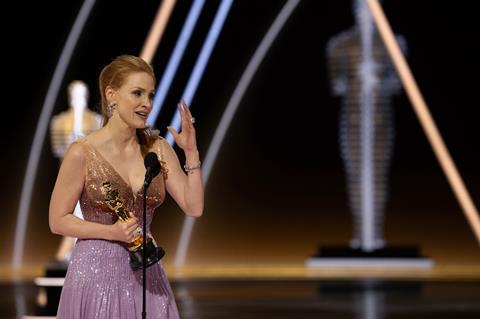
Although changes to Bafta’s voting processes have produced notable divergence with the Academy Awards in the nominations round, once again the winners – which are voted on by all voters, and with a sizeable overlap in the voting membership – show strong alignment between the two sets of awards.
For the third year running, at least 15 of the 19 feature categories that are common to the Oscars and Bafta Film Awards have seen the same winners. The overlap on this occasion is 15 winners – the same as in 2020, but down on the attention-grabbing 18 overlapping wins that occurred a year ago.
Although there was once again strong alignment in wins this year, three of the four discrepancies are in major categories: Oscar’s best picture win for Coda contrasts with Bafta anointing The Power Of The Dog in best film; Oscar picked Belfast for original screenplay, whereas Bafta went with Licorice Pizza; and The Eyes Of Tammy Faye’s Jessica Chastain won the actress Oscar, while Bafta winner Joanna Scanlan for After Love was not in the running at the Academy Awards.
Seven of the eight craft categories that are common to both awards see winners matching up, with only editing going in different directions: Dune’s Joe Walker at Oscar, and No Time To Die’s Tom Cross and Elliot Graham at Bafta. (Both awards have nine craft categories, but only the US Academy rewards original song, and only Bafta recognises casting.)
A year ago, likewise, the winners of seven craft categories matched, with only cinematography going in different directions (the Oscar to Mank and the Bafta to Nomadland). In 2020, once again, there were seven match-ups, with the exception being production design (Once Upon A Time In… Hollywood winning the Oscar and 1917 the Bafta).
For the second consecutive year, the winners of documentary feature, animated feature and international feature film (or film not in the English language in Bafta terminology) are all the same. Summer Of Soul, Encanto and Drive My Car won at both sets of awards this year – just like My Octopus Teacher, Soul and Another Round did last year.
One other aspect common to both of these academies’ awards: quips relating to Jada Pinkett-Smith. At the Baftas, host Rebel Wilson made a crack after Will Smith (who was absent) scooped the best actor prize: “I thought his best performance over the past year was being OK with all his wife’s boyfriends.” The comment may have made Smith especially alert – and sensitive – to any references to his wife at the Oscars ceremony.






![The Brightest SunScreen[Courtesy HKIFF]](https://d1nslcd7m2225b.cloudfront.net/Pictures/274x183/3/5/0/1448350_thebrightestsunscreencourtesyhkiff_312678.jpg)


















No comments yet